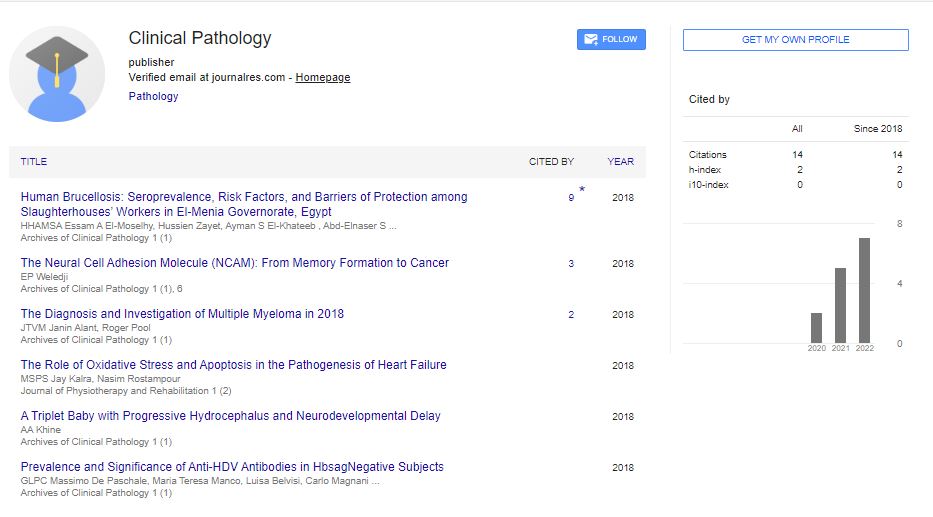Perspective, Arch Clin Pathol Vol: 6 Issue: 2
The Role of Molecular Pathology in Advancing Personalized Medicine
Kristy Ryan*
Department of Pathology, University of Colorado Anschutz Medical Campus, Aurora, USA
*Corresponding Author: Kristy Ryan
Department of Pathology, University of
Colorado Anschutz Medical Campus, Aurora, USA
E-mail: ryan@kristy.ucamc.edu
Received date: 28 May, 2023, Manuscript No. ACPY-23-107067
Editor assigned date: 31 May, 2023, Pre QC No. ACPY-23-107067 (PQ);
Reviewed date: 14 June, 2023, QC No. ACPY-23-107067
Revised date: 22 June, 2023, Manuscript No. ACPY-23-107067 (R);
Published date: 28 June, 2023, DOI: 2324-8955/acpy.05.03.100087
Citation: Ryan K (2023) The Role of Molecular Pathology in Advancing Personalized Medicine. Arch Clin Pathol 6:2.
Description
Personalized medicine, also known as precision medicine, is an emerging approach to healthcare that aims to tailor medical treatments and interventions to individual patients. It recognizes that each person's genetic makeup, environment, and lifestyle contribute to their unique health profile. To achieve the goal of personalized medicine, various disciplines and technologies are employed, including molecular pathology. Molecular pathology is a field that investigates the molecular and genetic basis of diseases, with a focus on understanding the mechanisms underlying disease development and progression. This study discuss how molecular pathology plays a essential role in advancing personalized medicine by enabling precise diagnostics, targeted therapies, and improved patient outcomes.
Molecular pathology encompasses the analysis of genetic and molecular alterations in patient samples, such as tissues, blood, or bodily fluids. By using advanced techniques, such as next-generation sequencing and polymerase chain reaction, molecular pathologists can identify specific genetic mutations, gene expression patterns, and epigenetic modifications associated with various diseases. This molecular profiling enables accurate diagnosis and classification of diseases, facilitating the identification of targeted therapies and predicting patient outcomes. Examples include the use of molecular markers in cancer diagnostics, where specific genetic alterations can guide treatment decisions and help predict treatment response.
One of the key goals of personalized medicine is to develop targeted therapies that precisely address the underlying molecular abnormalities driving disease progression. Molecular pathology plays a dire role in identifying the specific molecular targets for therapy. Through molecular profiling, researchers can identify specific genetic mutations or altered gene expression patterns that contribute to disease pathogenesis. This knowledge allows the development of drugs or treatment strategies that selectively target these molecular abnormalities, leading to more effective and personalized treatment options. For instance, in oncology, targeted therapies such as tyrosine kinase inhibitors and immune checkpoint inhibitors have revolutionized cancer treatment by specifically targeting cancer cells with specific genetic mutations or protein expression patterns.
Pharmacogenomics is an important aspect of personalized medicine that aims to optimize drug selection and dosing based on an individual's genetic profile. Molecular pathology plays an essential role in identifying genetic variations that influence drug metabolism, response, and toxicity. By analyzing an individual's genetic makeup, including genes involved in drug metabolism and drug targets, molecular pathologists can predict an individual's response to specific medications. This information helps clinicians tailor drug choices and dosages, minimizing adverse reactions and maximizing therapeutic efficacy. Pharmacogenomics is particularly valuable in fields such as psychiatry, where genetic variations can impact a patient's response to psychotropic medications.
Liquid biopsies, which involve the analysis of Circulating Tumor DNA (ctDNA) or other biomarkers present in bodily fluids, are a rapidly evolving field in molecular pathology. These non-invasive tests offer several advantages over traditional tissue biopsies, including the ability to detect molecular alterations in real-time and monitor treatment response. Liquid biopsies have shown promise in cancer diagnosis, monitoring minimal residual disease, and detecting treatment resistance. Molecular pathology plays a pivotal role in developing and validating the analytical methods and assays required for liquid biopsies, enabling their integration into clinical practice for personalized medicine.
Molecular pathology also contributes to the identification of predictive and prognostic markers, which provide valuable information about disease outcomes and treatment response. By analyzing specific molecular alterations, such as gene mutations, chromosomal rearrangements, or protein expression patterns, molecular pathologists can identify biomarkers that predict disease progression, recurrence, or response to specific treatments. These markers aid clinicians in making informed decisions regarding treatment selection and follow-up monitoring. For example, in breast cancer, the presence of specific gene mutations can guide treatment decisions and inform patients about their risk of developing future cancers.
The field of molecular pathology is a cornerstone of personalized medicine, driving advancements in diagnostics, targeted therapies, and patient care. By understanding the molecular and genetic underpinnings of diseases, molecular pathologists can identify specific molecular targets for therapy, optimize drug selection and dosing, and develop predictive and prognostic markers. As molecular pathology continues to evolve, it holds the potential to further enhance personalized medicine, leading to improved patient outcomes, reduced adverse effects, and more efficient healthcare delivery. Through the harnessing of molecular pathology, personalized medicine is transforming the landscape of healthcare, paving the way for precision diagnostics and targeted therapies tailored to individual patients.
 Spanish
Spanish  Chinese
Chinese  Russian
Russian  German
German  French
French  Japanese
Japanese  Portuguese
Portuguese  Hindi
Hindi 